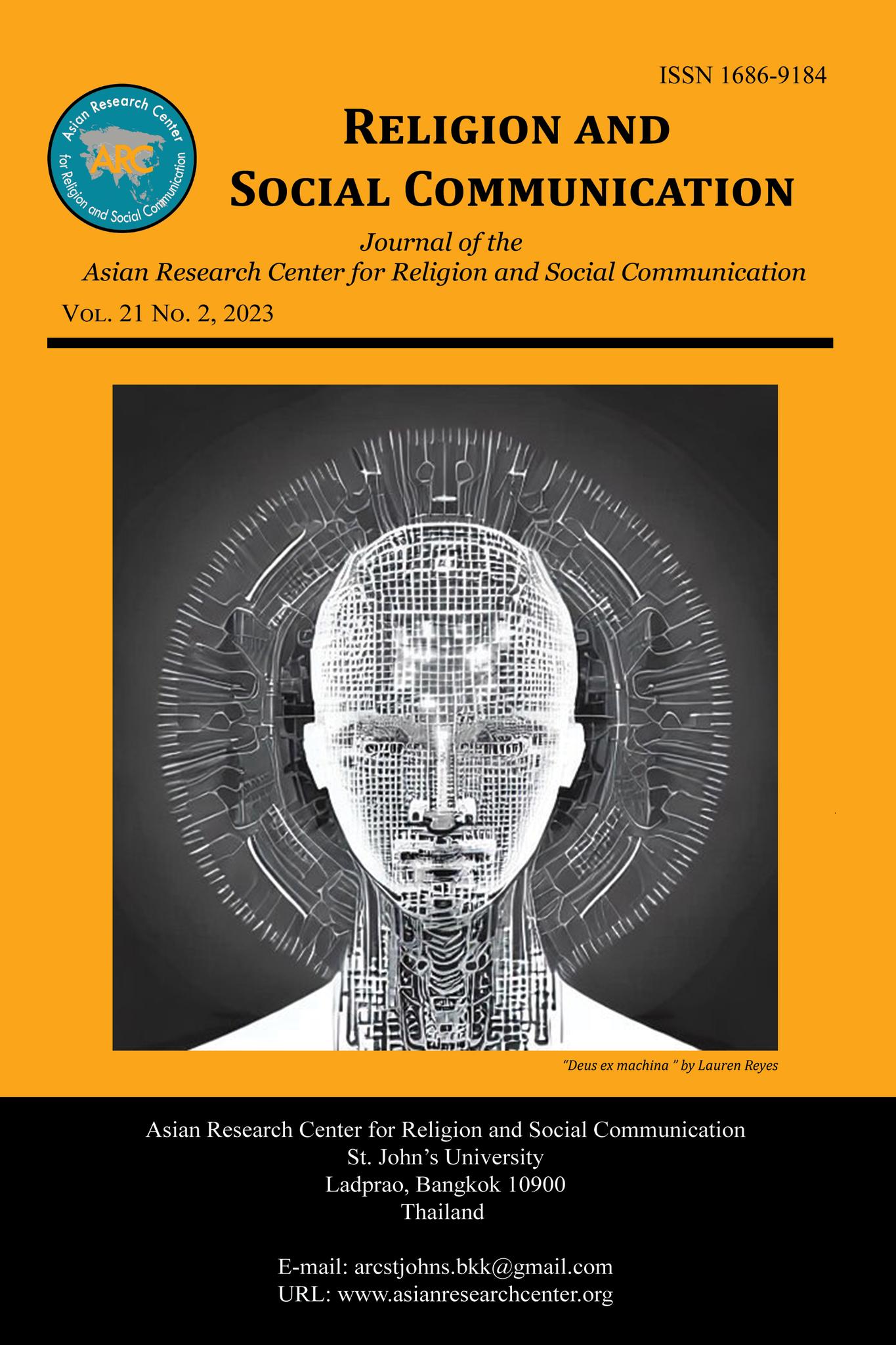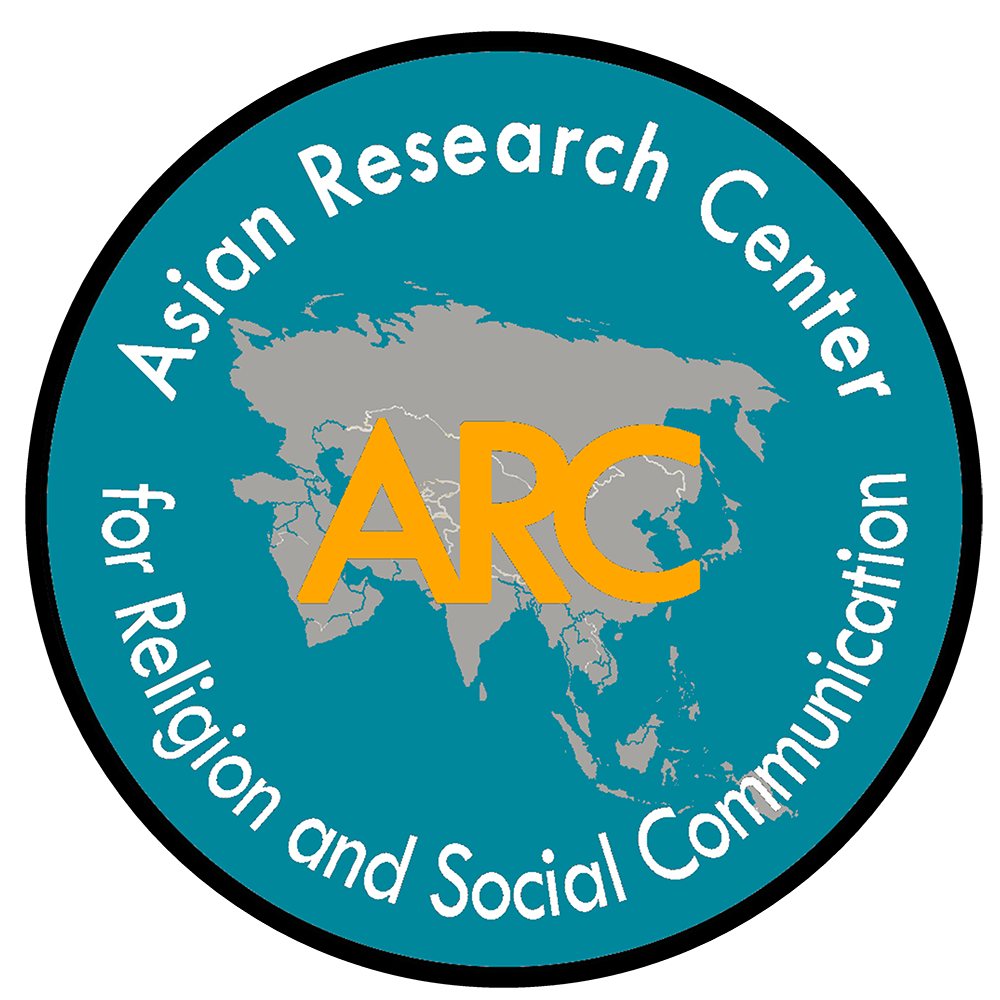Exploring the Role of Artificial Intelligence in Interreligious Discourse
RELIGION AND SOCIAL COMMUNICATION VOLUME 21, NO. 2 (2023)
ISSN 1686-9184
Author
Rico C. Jacoba
Abstract
This article delves into the rich tapestry of existing literature surrounding the intersection of Artificial Intelligence (AI) and Interreligious Dialogue (ID). Through a careful analysis of available scholarly works, the paper endeavors to shed light on the profound influence that AI exerts on discussions among individuals representing diverse religious backgrounds. By examining the dynamic interplay between AI and ID, the study seeks to unravel the intricate ways in which technology shapes and continues to shape conversations within this multifaceted context.
The primary objective is to deepen our understanding of the opportunities and challenges that unfold at the crossroads of AI and ID. This exploration is poised to contribute valuable insights that extend beyond theoretical frameworks, providing practical implications for scholars, practitioners, and policymakers alike. In essence, the article aims to serve as a compass, navigating the complex terrain where AI and interreligious discourse converge.
As the study unfolds, it specifically aims to identify distinct domains where AI can be harnessed to play a constructive role in fostering and facilitating interreligious dialogue. By elucidating the potential contributions of AI in this realm, the article strives to offer a forward-looking perspective that transcends the current situation. Ultimately, this endeavor not only maps the existing landscape of AI in interreligious dialogue but also charts a course for future research, exploration, and application in this evolving and significant field.
Keywords
artificial intelligence, interreligious dialogue, ethical considerations, religious diversity, technology
References
Abhivardhan. “Developing an Indic Approach to Artificial Intelligence Ethics: Critical Reflection on India’s Vulnerabilities and Strategic Vision as a Soft Power.” June 3, 2021. https://ssrn.com/abstract=3859590.
Agarwal, Shubhangi, Bhawna Agarwal, and Ruchika Gupta. “Chatbots and Virtual Assistants: A Bibliometric Analysis.” Library Hi Tech 40, no. 4 (2022): 1013-1030.
Amirfarhangi, Farideh, and Ahmad Ramezani. “Social Media and Interfaith Dialogue.” Journal of PURE LIFE 7, no. 23 (2020): 23-46. DOI: 10.22034/IMJPL.2020.2118.
Anderson, William HU, ed. Technology and Theology. Edmonton: Vernon Press, 2021.
Andriansyah, Yuli. “The Current Rise of Artificial Intelligence and Religious Studies: Some Reflections Based on ChatGPT.” Millah: Journal of Religious Studies (2023): ix-xviii.
Anthes, Gary. “Artificial Intelligence Poised to Ride a New Wave.” Communications of the ACM 60, no. 7 (2017): 19-21.
Ashraf, Cameran. “Exploring the Impacts of Artificial Intelligence on Freedom of Religion or Belief Online.” The International Journal of Human Rights 26, no. 5 (2022): 757–791. https://doi.org/10.1080/13642987.2021.1968376.
Atwell, Eric, et al. “An Artificial Intelligence Approach to Arabic and Islamic Content on the Internet.” Proceedings of NITS 3rd National Information Technology Symposium. Leeds, 2011.
Bainbridge, W. S. A Prophet’s Reward: Dynamics of Religious Exchange. Lanham: Rowman & Littlefield Publishers, 2003.
Bell, G., D. Chong, and R. Snyder. “Machine Learning Approaches to Conflict Analysis and Resolution.” In Leashing the Dogs of War: Conflict Management in a World without Leashes, edited by C. Crocker and F. O. Hampson, 125-146. Oxford, UK: Oxford University Press, 2022.
Benanti, Paolo. “The Urgency of an Algorethics.” Discover Artificial Intelligence 3, no. 1 (2023): 11. DOI: https://doi.org/10.1007/s44163-023-00056-6.
Bhuiyan, J. “Are chatbots changing the face of religion? Three faith leaders on grappling with AI.” The Guardian, April 7, 2023. https://www.theguardian.com/technology/2023/apr/07/chatgpt-artificial-intelligence-religion-faith-leaders
Bishop’s Conference of England and Wales. “Pope Francis Urges Ethical Use of Artificial Intelligence.” March 27, 2023. https://www.cbcew.org.uk/pope-francis-urges-ethical-use-of-artificial-intelligence/
Boehle, J. “The UN System and Religious Actors in the Context of Global Change.” CrossCurrents 60, no. 3 (2010): 383-401.
Campdepadrós-Cullell, Roger, Miguel Ángel Pulido-Rodríguez, Jesús Marauri, and Sandra Racionero-Plaza. “Interreligious Dialogue Groups Enabling Human Agency.” Religions 12, no. 3 (2021): 189. https://doi.org/10.3390/rel12030189.
Cheong, Philip H. “Bounded Religious Automation at Work: Communicating Human Authority in Artificial Intelligence Networks.” Journal of Communication Inquiry 45, no. 1 (2021): 5–23. https://doi.org/10.1177/0196859920977133
Cheong, Philip H. “Robots, Religion and Communication: Rethinking Piety, Practices and Pedagogy in the Era of Artificial Intelligence.” In Religion in the Age of Digitalization: From New Media to Spiritual Machines, edited by G. Isetti, E. Innerhofer, H. Pechlaner, and M. de Rachewiltz, 86–96. London, UK: Routledge, 2020.
Daily Trust. “Nigeria: 5th International Conference on Youth and Interfaith Dialogue.” All Africa, November 21, 2013. https://www.uri.org/uri-story/20131121-5th-international-conference-youth-interfaith-dialogue-held-nigeria.
Dessì, Ugo. The Global Repositioning of Japanese Religions: An Integrated Approach. London and New York: Routledge, 2017. DOI: 10.4324/9781315557601. ISBN: 9781315557601.
Dörr, O., and K. Schmalenbach. Vienna Convention on the Law of Treaties. New York, USA: Springer, 2018.
Duan, Yanqing, John S. Edwards, and Yogesh K. Dwivedi. “Artificial Intelligence for Decision Making in the Era of Big Data—Evolution, Challenges, and Research Agenda.” International Journal of Information Management 48 (2019): 63-71.
European Council of Religious Leaders. “About Us.” ND. http://www.eurocrl.eu/about-us/.
Flecha, R. Sharing Words: Theory and Practice of Dialogic Learning. New York: Rowman & Littlefield, [1997] 2000.
Freire, P. Pedagogy of the Oppressed. New York: Continuum, [1968] 1995.
Fung, Brian. “Pope Francis Warns About AI’s Dangers.” CNN, August 9, 2023. https://edition.cnn.com/2023/08/09/tech/pope-francis-ai/index.html#:~:text=Pope%20Francis%20warned%20that%20artificial,AI%20to%20do%20so%20responsibly.
Gaffney, Hannah, Warren Mansell, Rachel Edwards, and Jason Wright. “Manage Your Life Online (MYLO): A Pilot Trial of a Conversational Computer-Based Intervention for Problem Solving in a Student Sample.” Behavioural and Cognitive Psychotherapy 42, no. 6 (2014): 731-746.
Galván, José María. “Virtù Morale della Religione e Tecnologia dell’Intelligenza Artificiale.” Quaderni di Diritto e Politica Ecclesiastica 23, no. 2 (2020): 367–378. https://doi.org/10.1440/98368.
Geraci, Robert M. “Apocalyptic AI: Religion and the Promise of Artificial Intelligence.” Journal of the American Academy of Religion 76, no. 1 (2008): 138–166. https://doi.org/10.1093/jaarel/lfm101.
Geraci, Robert M. “Robots and the Sacred in Science and Science Fiction: Theological Implications of Artificial Intelligence.” Zygon 42, no. 4 (2007): 961–980. https://doi.org/10.1111/j.1467-9744.2007.00883.x.
Geraci, Robert M. “Spiritual Robots: Religion and Our Scientific View of the Natural World.” Theology and Science 4, no. 3 (2006): 229–246. https://doi.org/10.1080/14746700600952993.
Galal, Lise Paulsen. "Between Representation and Subjectivity: Interreligious Dialogue in Denmark." Interdisciplinary Journal for Religion and Transformation in Contemporary society 6, no. 2 (2020): 449-472. Green, Bruce P. “Ethical Reflections on Artificial Intelligence.” Scientia et Fides 6, no. 2 (2018): 9–31. https://doi.org/10.12775/SetF.2018.015.
Grudin, Jonathan. “AI and HCI: Two Fields Divided by a Common Focus.” AI Magazine 30, no. 4 (2009): 48.
Gupta, Aishwarya, Divya Hathwar, and A. Vijayakumar. “Introduction to AI Chatbots.” International Journal of Engineering Research and Technology 9, no. 7 (2020): 255-258.
Gusha, I. S. “KAICIID: An Emerging Significant Player in Global Interfaith and Development Initiatives.” In Religion and Conflict in a Globalizing World: Conflict Prevention and Transformation and Peacebuilding through Interreligious Dialogue, edited by P. Van Tongeren, N. M. P. Bocken, R. R. Ganzevoort, and M. De Haardt, 65-80. Cham: Springer International Publishing, 2022.
Gustafson, S. M. “Interreligious Studies.” In The Routledge Handbook of Religion, Spirituality, and Social Work, edited by J. S. Siker, 87-97. New York: Routledge, 2020.
Habermas, J. The Theory of Communicative Action: Volume Two. London and New York: Cambridge: Polity Press, [1981] 2010.
Harvard University, The Graduate School of Arts and Sciences. August 28, 2017. Blog. Rockwell Anyoha. “Special Edition on Artificial Intelligence: The History of Artificial Intelligence, Can Machines Think?” https://sitn.hms.harvard.edu/flash/2017/history-artificial-intelligence/.
Hassoon, A., et al. “Increasing Physical Activity Amongst Overweight and Obese Cancer Survivors Using an Alexa-based intelligent Agent for Patient Coaching: Protocol for the Physical Activity by Technology Help (PATH) Trial.” JMIR Research Protocol 7, no. 2 (2018): e27. DOI: 10.2196/resprot.9096.
Habermas, J. The Theory of Communicative Action, vol 1: Reason and the Rationalization of Society. Boston: Beacon Press (1984).
Interreligious Dialogue Conference 2010, access November 10, 2023. https://www.culturaldiplomacy.org/academy/index.php?en_historical-examples.
Jacoba, Gian Lloyd B. “Using the Twitter Data Classifier Web Application (TDCWA) to Identify Social Issues for the Philippines’ Synod of Synodalities.” Religion and Social Communication 21, no.1 (2023): 29-58.
Juhant, Janez, and Vojko Strahovnik, eds. Dialogue in the Global World: From Ideologies to Persons. Vol. 1. LIT Verlag Münster, 2014.
Kaput, Mike. “What Is Artificial Intelligence for Social Media?” Marketing AI Institute, April 18, 2022. https://www.marketingaiinstitute.com/blog/what-is-artificial-intelligence-for-social-media.
Kimura, Takeshi. “Robotics and AI in the Sociology of Religion: A Human in Imago Roboticae.” Social Compass 64, no. 1 (2017): 6–22. https://doi.org/10.1177/0037768616683326.
Le Duc, Anthony. “Prophetic Dialogue as an Approach to the Church’s Engagement with Stakeholders of the Technological Future.” Available at SSRN 4461295 (2023).
Le Duc, Anthony. “Religion and Digital Technology: Future Considerations” (September 20, 2020). Religion and Society in the Digital Age (Moldova: Eliva Press, 2020). Available at SSRN: https://ssrn.com/abstract=4364586 or http://dx.doi.org/10.2139/ssrn.4364586.
Lin, Chien‐Te. “All about the Human: A Buddhist Take on AI Ethics.” Business Ethics, the Environment & Responsibility, May 4, 2023. https://doi.org/10.1111/beer.12547.
Lubov, Deborah Castellano. “Pope Francis Urges Ethical Use of Artificial Intelligence.” Vatican News, March 27, 2023. https://www.vaticannews.va/en/pope/news/2023-03/pope-francis-minerva-dialogues-technology-artificial-intelligenc.html.
McCarthy, John, Marvin L. Minsky, Nathaniel Rochester, and Claude E. Shannon. “A Proposal for the Dartmouth Summer Research Project on Artificial Intelligence, August 31, 1955.” AI Magazine 27, no. 4 (2006): 12-12.
McKeown, Jonah. “Sentient AI?: Here’s what the Catholic Church says about artificial intelligence.” Catholic News Agency, June 15, 2022. https://www.catholicnewsagency.com/news/251552/sentient-ai-heres-what-the-catholic-church-says-about-artificial-intelligence#:~:text=Transparency%3A%20AI%20systems%20must%20be,not%20follow%20or%20create%20biases.
Merliana, Ni Putu Eka, and Ni Nyoman Tantri. “Improving the Quality of Hindu Education in the Era of Society 5.0 through Digital Culture.” International Proceeding on Religion, Culture, Law, Education, and Hindu Studies 1 (2022): 203-216.
Metzler, Ted, Amanda Beyers, and John Goulden. “Overcoming Obstacles in Religion-and-Science Dialogue with an Agent-Based Computer Simulation Tool.” Conference Archive, 2004. https://www.metanexus.net/archive/conference2004/pdf/metzler.pdf
Nawi, Aliff, et al. “A Preliminary Survey of Muslim Experts’ Views on Artificial Intelligence.” Islamiyyat 43, no. 2 (2021): 3-16.
Newborn, Monroe, and Monty Newborn. Deep Blue: An Artificial Intelligence Milestone. New York: Springer Science & Business Media, 2003.
Pancane, I. Wayan Dikse, Nyoman Dantes, and Ni Nyoman Perni. “The Phenomenon of Artificial Intelligence as a Future Dream Technology According to Hindu’s Teachings.” Vidyottama Sanatana: International Journal of Hindu Science and Religious Studies 6, no. 1 (2022): 124-136.
Patel, E. Interfaith Leadership: A primer. Boston: Beacon Press, 2016.
Pecorario, A. “Interfaith Dialogue, Technology, and the Need for a New Humanism.” Vatican Dicastery for Promoting Integral Human Development, January 18, 2022. https://blog.g20interfaith.org/2022/01/18/interfaith-dialogue-technology-and-the-need-for-a-new-humanism/, January 18, 2022.
Pistrang, N., and C. Barker. “Varieties of Qualitative Research: A Pragmatic Approach to Selecting Methods.” In APA Handbook of Research Methods in Psychology, Volume 2: Research Designs: Quantitative, Qualitative, Neuropsychological, and Biological, edited by H. Cooper et al., 5–18. Washington: American Psychological Association, 2012.
Pokrivcakova, Silvia. “Preparing Teachers for the Application of AI-Powered Technologies in Foreign Language Education.” Journal of Language and Cultural Education 7, no. 3 (2019): 135-153.
Russell, Stuart. Human Compatible: Artificial Intelligence and the Problem of Control. Penguin, 2019.
Sadiku, Matthew NO, Tolulope J. Ashaolu, Abayomi Ajayi-Majebi, and Sarhan M. Musa. “Artificial Intelligence in Social Media.” International Journal of Scientific Advances 2, no. 1 (2021): 15-20.
Singler, Beth. “An Introduction to Artificial Intelligence and Religion for the Religious Studies Scholar.” Implicit Religion 20, no. 3 (2017): 215–231. https://doi.org/10.1558/imre.35901.
UN Human Rights Committee, ‘General Comment No. 22: The Right to Freedom of Thought, Conscience and Religion (Art. 18).
UNESCO. “Recommendation on the Ethics of Artificial Intelligence.” November 23, 2021, Paris, France. https://www.unesco.org/en/legal-affairs/recommendation-ethics-artificial-intelligence.
Wells, Christopher. “Pope Francis on Interreligious Dialogue and Ethical Use of Artificial Intelligence.” Vatican News, June 2022. https://www.vaticannews.va/en/pope/news/2022-06/pope-interreligious-dialogue-as-a-providential-sign-of-our-time.html.
Verma, Priyash, and Shilpi Sharma. “Artificial Intelligence-Based Recommendation System.” In 2020 2nd International Conference on Advances in Computing, Communication Control and Networking (ICACCCN), 669-673. IEEE, 2020.
Vestrucci, Andrea. “Language of Religion, Religions as Languages. Introduction to the Special Issue ‘Religions and Languages: A Polyphony of Faiths’.” Sophia 61, no. 1 (2022): 1-7.
Vinichenko, M. V., E. V. Frolova, G. Y. Nikiporets-Takigawa, and P. Karácsony. “Interpretation of the Views of East European Catholics on the Impact of Artificial Intelligence on the Social Environment.” European Journal of Science and Theology 17, no. 1 (2021): 11–23. http://www.ejst.tuiasi.ro/Files/86/2_Vinichenko%20et%20al.pdf.
Xu, Guixian, Yueting Meng, Xiaoyu Qiu, Ziheng Yu, and Xu Wu. “Sentiment Analysis of Comment Texts Based on BiLSTM.” IEEE Access 7 (2019): 51522-51532.
Zhang, Qian, Jie Lu, and Yaochu Jin. “Artificial Intelligence in Recommender Systems.” Complex & Intelligent Systems 7 (2021): 439-457.
PAGES 375-400
DOI:https://doi.org/10.62461/RCJ100323
Submitted: July 15, 2023, 2023; Accepted: October 3, 2023; Published: December 31, 2023.





